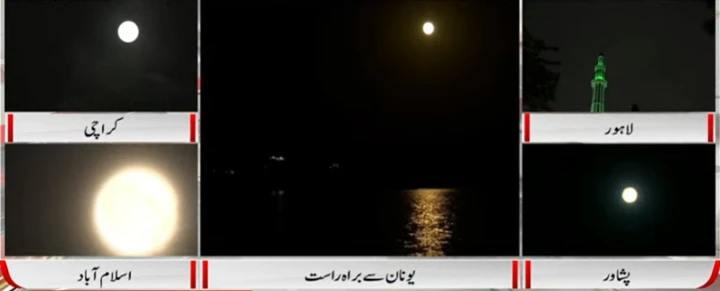Super Blue Moon seen in Pakistan

Stay tuned with 24 News HD Android App

A breathtaking celestial event captivated the skies over Pakistan, as residents in cities like Islamabad, Karachi, Lahore, and others witnessed an exceptionally bright and large moon on Monday night.
This spectacle, known as the Super Blue Moon, created a mesmerizing view across the country.
The Super Blue Moon, which is appearing for the first time in Pakistan, was visible not only in Pakistan but also in various parts of the world, including Greece, UK, Australia, India, South Korea, and Indonesia.
The sight drew widespread attention as the moon appeared significantly larger and brighter than usual.
Astronomical experts have explained that the phenomenon of a Super Blue Moon occurs when the moon is both full and at its closest point to Earth in its orbit, known as perigee.
This makes the moon appear larger and more luminous. The term "Blue Moon" refers to the occurrence of a second full moon within the same calendar month or the appearance of four full moons in a single season, as was the case this time.
Looking ahead, experts have noted that this rare event won't happen again until January 2037.
However, sky gazers can still look forward to three upcoming Super Moons, scheduled to appear on September 18, October 17, and November 15 of this year.
These events are expected to offer similarly striking views, though not as rare as the Super Blue Moon.
Though it's called a blue moon, it doesn't have anything to do with color. There are two types of blue moon - seasonal and monthly - according to Space.com.
The third full moon in a season with four full moons is known as a seasonal Blue Moon. This is the kind of blue moon that is traditionally defined, and it will rise on August 19.
The second kind of Blue Moon is just the second full moon in a single calendar month. It was the result of a misinterpretation of the first definition.
Rather than being an error, this monthly "Blue Moon" concept is now recognized as an alternate meaning.
Retired NASA Program Executive Gordon Johnston said, "Although it will not look blue, as the third full Moon in a season with four full Moons, this will be a Blue Moon. The first recorded use of 'Blue Moon' in English dates from 1528."
"Speculations on the origin of the term include an old English phrase that means 'betrayer Moon' (because it led to mistakes in setting the dates for Lent and Easter). Or it may be a comparison to rare events such as when dust in the atmosphere makes the Moon appear blue. Since the 1940s the term 'Blue Moon' has also been used for the second full Moon in a month that has two full Moons," he added.
